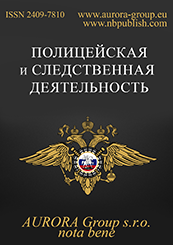The police and criminal procedure
Reference:
Khimedenova, D.N., Gorbacheva, T.I. (2025). Actual problems of regulatory consolidation of the cryptocurrency in the Russian Federation. Police and Investigative Activity, 3, 1–14. https://doi.org/10.25136/2409-7810.2025.3.73696
Abstract:
The subject of the study is the phenomenon of cryptocurrency, current problems of legal regulation and prospects for legislative development in the Russian Federation. Despite the rapid spread in the economic and financial space, this type of currency actually found itself outside the field of view of the Russian legislator, which in practice creates numerous problems, aggravated by the lack of unity of views on explaining its essential aspects in the modern scientific environment. The purpose of the work is a thorough consideration of the provisions of substantive law that characterize such a fundamentally new segment of public relations as illegal activities with cryptocurrency. The objectives of the research are a detailed examination of the theoretical, legal, economic and conceptual aspects of cryptocurrency in the doctrine and current legislation of the Russian Federation. A wide range of general scientific and private scientific methods was used in the research, including forecasting, modeling, and formal law. Their application allowed us to develop the most effective ways to eliminate the identified problems. For example, using the forecasting method, it was possible to construct a model of legal regulation of cryptocurrency values in the Russian Federation. Development of an optimal model of legal regulation and improvement of criminal law tools for countering the use of cryptocurrencies for criminal purposes. In contrast to the studies that previously existed in the legal doctrine, this work for the first time concludes that it is necessary to comprehensively amend various branches of the current law. The author of the article analyzes the legislative and doctrinal uncertainty of the concept of cryptocurrency, pointing out its "defects". Through the analysis of judicial practice and the opinions of reputable jurists, it is proved that the problematic field of Russian legislation is the status of cryptocurrency, which is relevant due to its multifaceted practical significance in the context of informatization of public relations. It is concluded that it is necessary to classify cryptocurrency valuables as "other property", which should be reflected in both civil and criminal law. The possibility of recognizing cryptocurrencies as the subject of theft, as well as the subject of confiscation, has been determined. The practical significance of the conclusions is proved. The introduction of the proposed amendments to Articles 128 of the Civil Code of the Russian Federation and Article 158 of the Criminal Code of the Russian Federation will help optimize law enforcement practice in terms of countering the illicit trafficking of various types of cryptocurrencies. The results obtained can be used in the course of improving the current Russian legislation.
Keywords:
legalization, virtual currency, property, the doctrine, judicial practice, subject of theft, illegal traffic, cryptocurrency, cryptocrime, active
The police and protection of human rights
Reference:
Serenko, R.S. (2025). Release from criminal liability in Russia and Germany: common trends and national peculiarities. Police and Investigative Activity, 3, 15–32. https://doi.org/10.25136/2409-7810.2025.3.74389
Abstract:
The object of the study is the norms of criminal and criminal procedural law of Russia and Germany that regulate the grounds, conditions, and procedures for exemption from criminal liability, as well as the doctrinal interpretations of their socio-legal significance. Overall, the article is devoted to a comprehensive comparative legal analysis of the institution of exemption from criminal liability in the legislation of the Russian Federation and the Federal Republic of Germany. The study covers both substantive and procedural aspects of this institution, treating it as an important tool of modern criminal policy aimed at humanizing and differentiating criminal liability. The article thoroughly investigates the normative grounds for exemption from criminal liability in the Criminal Code of the Russian Federation and the Criminal Code of Germany, including aspects such as active repentance, reconciliation with the victim, expiration of the statute of limitations, as well as new provisions of Russian legislation. The methodological basis of the study is composed of comparative legal, formal-legal, and historical-legal methods, which allowed for an in-depth analysis of legislative constructions and their evolution. The scientific novelty of the work lies in the comprehensive comparison of Russian and German approaches to exemption from criminal liability, as well as in the development of proposals for improving Russian legislation based on German experience. The results of the study demonstrate that, despite a common focus on the humanization of criminal law, the institution of exemption from liability in Germany features greater procedural flexibility and a combination of substantive and procedural norms. The feasibility of borrowing certain elements of the German model to optimize Russian law enforcement is justified, particularly the introduction of mechanisms for conditional cessation of criminal cases. The article may be of interest to researchers in criminal law, legislators, and law enforcement officers dealing with issues related to the improvement of institutions for exemption from criminal liability and the humanization of criminal policy.
Keywords:
alternatives to criminal punishment, statute of limitations, law enforcement practice, active repentance, comparative law, release from liability, criminal law, humanization of criminal law, differentiation of responsibilities, criminal liability
 This work is licensed under a Creative Commons Attribution-NonCommercial 4.0 International License.
This work is licensed under a Creative Commons Attribution-NonCommercial 4.0 International License.









 © 1998 – 2025 Nota Bene. Publishing Technologies. NB-Media Ltd.
© 1998 – 2025 Nota Bene. Publishing Technologies. NB-Media Ltd.




